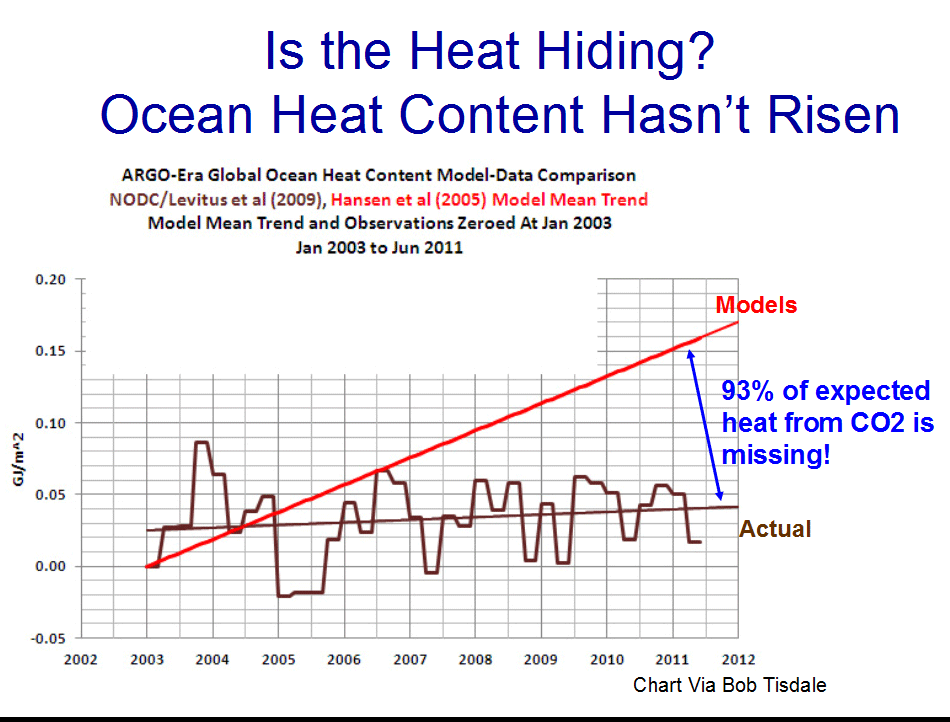"natural variability complicates the detection of anthropogenic climate change in the twenty-first century. Now, research shows that evidence of human influence first emerges from sea level rather than temperature rise."This is a curious move of the goalposts, since the IPCC claims a bogus 95% confidence that "most" of the warming since 1950 is anthropogenic on the basis of temperature rise since 1950, not on the basis of sea level rise, and thus opposite to the claims of this new paper. In addition, this new paper claims climate models predict allegedly anthropogenic "sea level rise signals can arise as early as 2020 over half the global ocean regions."
If that's the case, there's a lot of sea level rise catching up to do, since global sea levels have been naturally rising for ~20,000 years and have decelerated over the past 8,000 years, decelerated over the 20th century, decelerated 31% since 2002 and decelerated 44% since 2004 to less than 7 inches per century. There is no evidence of an acceleration of sea level rise, and therefore no evidence of any effect of mankind on sea levels. Sea level rise is primarily a local phenomenon related to land subsidence, not CO2 levels.
Further, observational data shows 86%-93% of the alleged AGW "missing heat" is still missing and not in the oceans or atmosphere, and missing or non-existent heat cannot cause sea level rise.
In addition, a paper published today in the Journal of Atmospheric and Oceanic Technology finds that the long-term ocean heat content trend is less than previously believed due to sampling biases. The authors "concluded that Argo-period climatologies [only available since 2004] should be used to accurately assess the long-term trend of the climate indicators such as OHC [ocean heat content]."
And what do ARGO-period ocean heat observations show? A tiny increase in ocean heat content, or even a decrease of ocean heat content [before Josh Willis "corrected the ocean cooling" by throwing away the ARGO float data he thought was too cold]
 |
| ARGO data before "correction" to remove cooling |
Even with the biased and artificially warmed long-term ocean heat content data, the record only shows a very tiny 0.09C ocean warming over the past 55 years.
Thus, sea level rise and ocean heat content have "paused" right along with the "pause" in global surface temperatures. It will likely be many years [if ever] before a clear "signal" of anthropogenic global warming is detected in sea level rise acceleration, ocean heat content acceleration, surface temperature rise, or a tropospheric "hot spot," all of which still remain missing in the 21st century.
Excerpt from Nature Climate Change:
Excerpt from Nature Climate Change:
Time of emergence for regional sea-level change
- Nature Climate Change
- 4,
- 1006–1010
- doi:10.1038/nclimate2397
- Received
- Accepted
- Published online
Determining the time when the climate change signal from increasing greenhouse gases exceeds and thus emerges from natural climate variability (referred to as the time of emergence, ToE) is an important climate change issue1. Previous ToE studies were mainly focused on atmospheric variables2, 3, 4, 5, 6, 7. Here, based on three regional sea-level projection products available to 2100, which have increasing complexity in terms of included processes, we estimate the ToE for sea-level changes relative to the reference period 1986–2005. The dynamic sea level derived from ocean density and circulation changes alone leads to emergence over only limited regions. By adding the global-ocean thermal expansion effect, 50% of the ocean area will show emergence with rising sea level by the early-to-middle 2040s. Including additional contributions from land ice mass loss, land water storage change and glacial isostatic adjustment generally enhances the signal of regional sea-level rise (except in some regions with decreasing total sea levels), which leads to emergence over more than 50% of the ocean area by 2020. The ToE [time of emergence of an anthropogenic "signal"] for total sea level is substantially earlier than that for surface air temperature and exhibits little dependence on the emission scenarios, which means that our society will face detectable sea-level change and its potential impacts earlier than surface air warming.

.PNG)
.PNG)
No comments:
Post a Comment